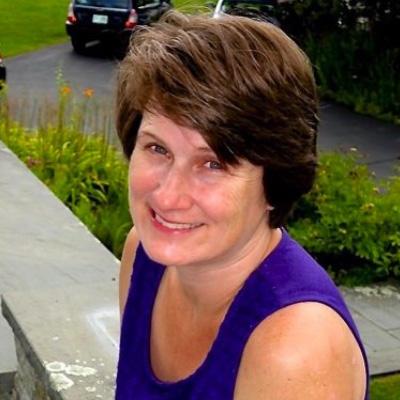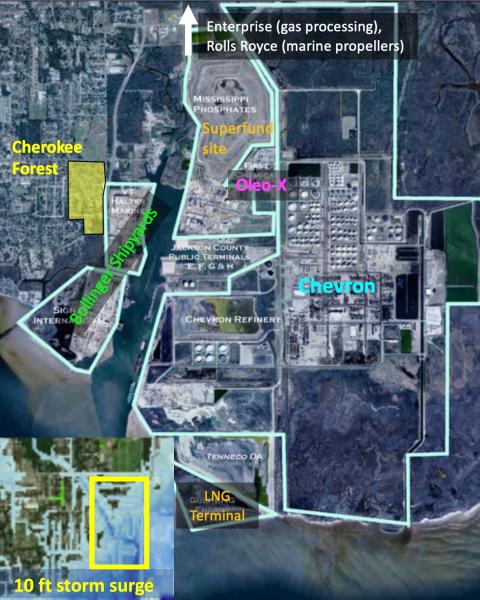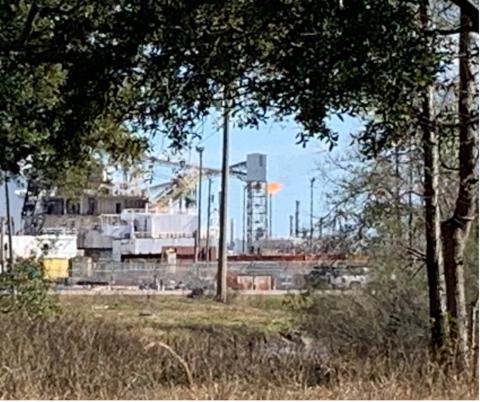
Dr. Katharine Duderstadt is a Research Scientist in the Earth Systems Research Center and Affiliate faculty in Earth Sciences. Her interests center on how interdisciplinary and multi-institutional collaborations along with community-engaged research can lead to sustainable solutions, especially concerning climate and air pollution. In 2023, Dr. Duderstadt was a UNH Sustainability Award recipient recognizing her work advancing sustainability through interdisciplinary coordination and research on inherent social inequities in environmental pollution and climate change. Funding provided by the award has supported travel to Pascagoula, Mississippi to work with residents of the Cherokee Forest fenceline subdivision as part of the American Geophysical Thriving Earth Exchange. Duderstadt and University of Colorado student Caroline Frischmon are collaborating with community lead Barbara Weckesser and organizing expert Jennifer Crosslin to help the residents collect and analyze air pollution and health data. Their results are validating the experiences of community members as they grapple with the compound threats of toxic plumes from the Bayou Casotte Industrial Complex and flooding from hurricanes.
UNHSI: Tell us about your research and recent fieldwork trip.

Map showing the Cherokee Forest in proximity to industry. Inset shows potential for flooding in the neighborhood (NOAA’s Sea Level Rise viewer).
Duderstadt: Cherokee Forest is a small subdivision of homes constructed in the 1960s to house workers for the shipbuilding, petroleum, and chemical industries of the Bayou Casotte Industrial Complex. While many of the original families remain, the increasing levels of air, water, and noise pollution are making life in the neighborhood unbearable. Abandoned lots and overgrown cul-de-sacs also serve as a stark reminder of devastating storm surge flooding and subsequent rebuilding after hurricanes Georges and Katrina. The majority of residents are united in their desire for a buyout in order to retreat to safer and heathier places. They would like to see the subdivision converted back to forest and wetland, a natural buffer to help protect the rest of South Pascagoula from toxins and flooding.
Our initial task with Thriving Earth Exchange was to develop summary reports that visualize and communicate a decade of air pollution and health data to the community and local officials. This winter, we installed low-cost sensors, asking residents to track odors and health symptoms. We then held workshops for community members to analyze the datasets, gaining confidence and resolve as the scientific data confirms their stories and observations.
UNHSI: What keeps you excited and hopeful about sustainability in your work?
Duderstadt: It is exciting that scientists are embracing new ways of working with communities to achieve sustainable solutions. Instead of researchers approaching communities to study questions within their own academic disciplines, communities themselves are identifying problems and inviting interdisciplinary teams of researchers to help advance their goals, facilitated by liaison organizations such as the Thriving Earth Exchange.
Cherokee Concerned Citizens has spent over a decade conducting surveys and collecting data on air pollution and health effects to learn how to protect their families from industrial pollution and coastal flooding. Our role in contributing to this effort is synthesizing and visualizing existing data, installing low-cost sensors, and leading data workshops to develop materials to share with local officials. This work is validating personal observations and stories while also providing structural continuity for community science.

View from Cherokee Street showing a flare from the Chevron oil refinery. Bollinger shipyard is in the foreground, currently building a new Coast Guard icebreaker and refurbishing NOAA’s Ronald H. Brown research vessel.
While it remains a formidable challenge for small fenceline neighborhoods to confront state agencies and industrial giants, through community science residents are developing the confidence to trust their own observations and experiences. They are learning how to more accurately track and report pollution episodes and advocate for government support. Working with scientific data not only enhances collective power but also strengthens social connections, bringing the community closer together so they are able to better support one another during times of struggle and celebration.
UNHSI: How have the Sustainability Award funds helped advance your work?
Duderstadt: The Sustainability Award supported the trips to Pascagoula, providing first-hand experience with the pollution and its health effects as well as an opportunity to build trusting relationships with residents. The importance of this work has become even more evident after being welcomed into homes and hearing dozens of harrowing, yet inspiring stories.
UNHSI: What’s next for your research?
Duderstadt: Our contributions toward better understanding the composition and transport of industrial pollutants in the Cherokee Forest neighborhood adds to a decade of work by Cherokee Concerned Citizens to provide evidence supporting a buyout. This air pollution sensor data will also help enhance community understanding and oversight of an EPA-funded monitoring campaign planned to begin this summer by the Mississippi Department of Environmental Quality. In addition, we are hoping to model how converting the neighborhood into a natural buffer zone might affect the transport and dispersion of toxic plumes. We are coordinating our efforts with other Cherokee Concerned Citizens partners, including the Anthropocene Alliance, Buy-in, and the Community Noise Lab.
There are currently 85 million people in our nation living in counties with air pollution that exceeds national standards. The sustained commitment of groups like Cherokee Concerned Citizens provides hope that someday communities across the country will be able to work in concert with local governments, industry, scientific experts, and organizers to ensure that all residents have access to clean air and water.
